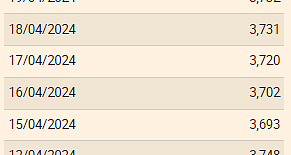A rant has its justification, especially from the point of view of the rant. Lately you can even curse to your heart's content in the museum. The exhibition "Potz! Blitz!” in the Berlin Museum for Communication is dedicated to the cultural heritage of scolding.
A damn good choice of location, by the way. Already on the way to the museum in Berlin-Mitte, visitors can familiarize themselves with the latest swear words in the capital, for example in the bus and subway, i.e. allow themselves to be insulted.
In the exhibition, cursing, nagging, banging is all the more lively. But not as an end in itself: visitors learn why scolding is also psychologically healthy. As linguist Kate Burridge puts it: “Swear words are socially and emotionally irreplaceable, critical components of our linguistic repertoire that help us reduce stress, manage pain, and increase strength and endurance.”
The curator and language expert Rolf-Bernhard Essig also thinks: “Is swearing part of being human? Hell yes. There's no other way to say it. From an early age, there is this special kind of attraction that expletives exude. We immediately have the impression that we can achieve something with it.”
The museum also asks visitors in which situation they curse most often. The top three are therefore: "On the road" in first place. It follows "When assembling an Ikea shelf". In third place: "On the crowded platform when the train composition is changed."
The online language learning platform Preply has also examined the swearing habits in Germany. The survey found that the average German swears 9.5 times a day.
Men typically use swear words more frequently than women: While they use an average of 11.06 swear words per day, the number for women is only 8.85.
And on which occasion is the most scolded? On the way in the car. 32.5 percent of Germans grumble behind the wheel or as a passenger.
Remarkable: Although men generally use more swear words than women, female drivers are more than twice as likely to use swear words. 37.9 percent admit that they swear most often behind the wheel, compared to only 18.5 percent of men.
The car rant is unusual compared to other nations. Only the Germans scold so vehemently while driving. Instead, Americans are most likely to swear at home (55 percent). Only seven percent complain on the streets.
According to Preply surveys, the situation is similar for Brits, Spaniards and Italians: the majority would rather scold at home than behind the wheel on the road. A possible explanation: They prefer to honk their horns angrily or give their opinion to the other person with clear hand signals.
The Preply portal also asked which German cities cursed the most. The Schimpf-Pokal goes to Dresden. With an average of 18 times a day, swearing is the most common here; the residents of Leipzig and Bochum complain the least.
Basically, Germans complain more about themselves than about others. And what about tolerance when others swear? 51.7 percent of those surveyed state that they feel disturbed by this, for 48.2 percent it is not a problem.
Visitors to the Schimpf exhibition in Berlin can test this until June 25, 2023. There is even a curse generator that creates new swear words. Suggestions are, for example, “ork-stylish thermal composter”, “fanatic trash lout” or “frivolous fecal worm”. On the way back in the subway, you can try out whether these swear words resonate in everyday life.

 The Euribor today remains at 3.734%
The Euribor today remains at 3.734% Germany: the trial of an AfD leader, accused of chanting a Nazi slogan, resumes this Tuesday
Germany: the trial of an AfD leader, accused of chanting a Nazi slogan, resumes this Tuesday New York: at Columbia University, the anti-Semitic drift of pro-Palestinian demonstrations
New York: at Columbia University, the anti-Semitic drift of pro-Palestinian demonstrations What is Akila, the mission in which the Charles de Gaulle is participating under NATO command?
What is Akila, the mission in which the Charles de Gaulle is participating under NATO command? What High Blood Pressure Does to Your Body (And Why It Should Be Treated)
What High Blood Pressure Does to Your Body (And Why It Should Be Treated) Vaccination in France has progressed in 2023, rejoices Public Health France
Vaccination in France has progressed in 2023, rejoices Public Health France Food additives suspected of promoting cardiovascular diseases
Food additives suspected of promoting cardiovascular diseases “Even morphine doesn’t work”: Léane, 17, victim of the adverse effects of an antibiotic
“Even morphine doesn’t work”: Léane, 17, victim of the adverse effects of an antibiotic MEPs validate reform of EU budgetary rules
MEPs validate reform of EU budgetary rules “Public Transport Paris 2024”, the application for Olympic Games spectators, is available
“Public Transport Paris 2024”, the application for Olympic Games spectators, is available Spotify goes green in the first quarter and sees its number of paying subscribers increase
Spotify goes green in the first quarter and sees its number of paying subscribers increase Xavier Niel finalizes the sale of his shares in the Le Monde group to an independent fund
Xavier Niel finalizes the sale of his shares in the Le Monde group to an independent fund Owner of Blondie and Shakira catalogs in favor of $1.5 billion offer
Owner of Blondie and Shakira catalogs in favor of $1.5 billion offer Cher et Ozzy Osbourne rejoignent le Rock and Roll Hall of Fame
Cher et Ozzy Osbourne rejoignent le Rock and Roll Hall of Fame Three months before the Olympic Games, festivals and concert halls fear paying the price
Three months before the Olympic Games, festivals and concert halls fear paying the price With Brigitte Macron, Aya Nakamura sows new clues about her participation in the Olympics
With Brigitte Macron, Aya Nakamura sows new clues about her participation in the Olympics Skoda Kodiaq 2024: a 'beast' plug-in hybrid SUV
Skoda Kodiaq 2024: a 'beast' plug-in hybrid SUV Tesla launches a new Model Y with 600 km of autonomy at a "more accessible price"
Tesla launches a new Model Y with 600 km of autonomy at a "more accessible price" The 10 best-selling cars in March 2024 in Spain: sales fall due to Easter
The 10 best-selling cars in March 2024 in Spain: sales fall due to Easter A private jet company buys more than 100 flying cars
A private jet company buys more than 100 flying cars This is how housing prices have changed in Spain in the last decade
This is how housing prices have changed in Spain in the last decade The home mortgage firm drops 10% in January and interest soars to 3.46%
The home mortgage firm drops 10% in January and interest soars to 3.46% The jewel of the Rocío de Nagüeles urbanization: a dream villa in Marbella
The jewel of the Rocío de Nagüeles urbanization: a dream villa in Marbella Rental prices grow by 7.3% in February: where does it go up and where does it go down?
Rental prices grow by 7.3% in February: where does it go up and where does it go down? Europeans: “All those who claim that we don’t need Europe are liars”, criticizes Bayrou
Europeans: “All those who claim that we don’t need Europe are liars”, criticizes Bayrou With the promise of a “real burst of authority”, Gabriel Attal provokes the ire of the opposition
With the promise of a “real burst of authority”, Gabriel Attal provokes the ire of the opposition Europeans: the schedule of debates to follow between now and June 9
Europeans: the schedule of debates to follow between now and June 9 Europeans: “In France, there is a left and there is a right,” assures Bellamy
Europeans: “In France, there is a left and there is a right,” assures Bellamy These French cities that will boycott the World Cup in Qatar
These French cities that will boycott the World Cup in Qatar Serie A: Bologna surprises AS Rome in the race for the C1
Serie A: Bologna surprises AS Rome in the race for the C1 Serie A: Marcus Thuram king of Italy, end of the debate for the position of number 9 with the Blues?
Serie A: Marcus Thuram king of Italy, end of the debate for the position of number 9 with the Blues? Milan AC-Inter Milan: Thuram and Pavard impeccable, Hernandez helpless… The tops and flops of the derby
Milan AC-Inter Milan: Thuram and Pavard impeccable, Hernandez helpless… The tops and flops of the derby Ligue 2: Auxerre leader, Bordeaux in crisis, play-offs... 5 questions about an exciting end of the season
Ligue 2: Auxerre leader, Bordeaux in crisis, play-offs... 5 questions about an exciting end of the season


















